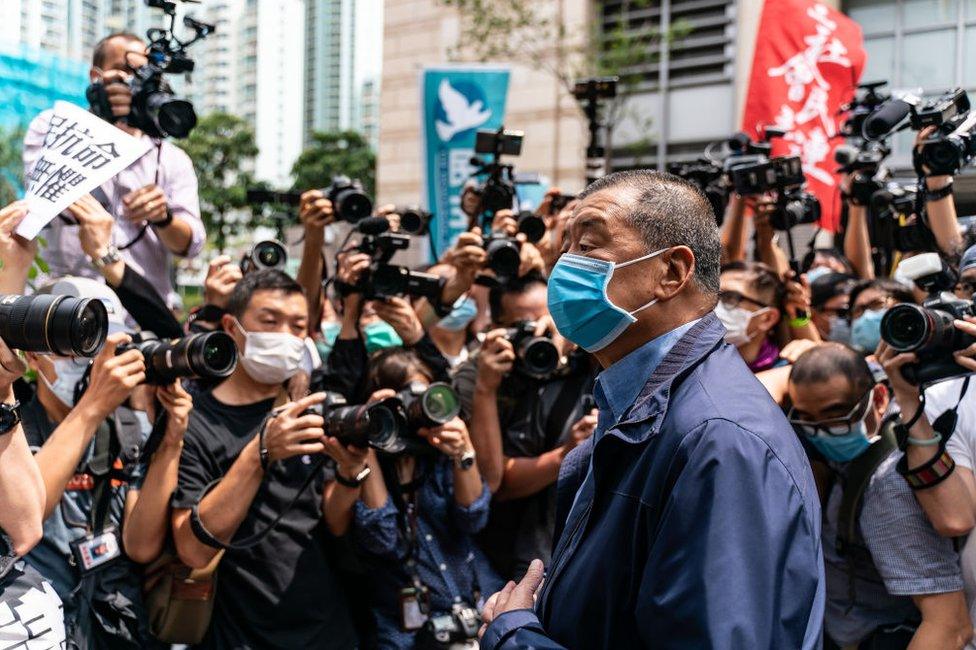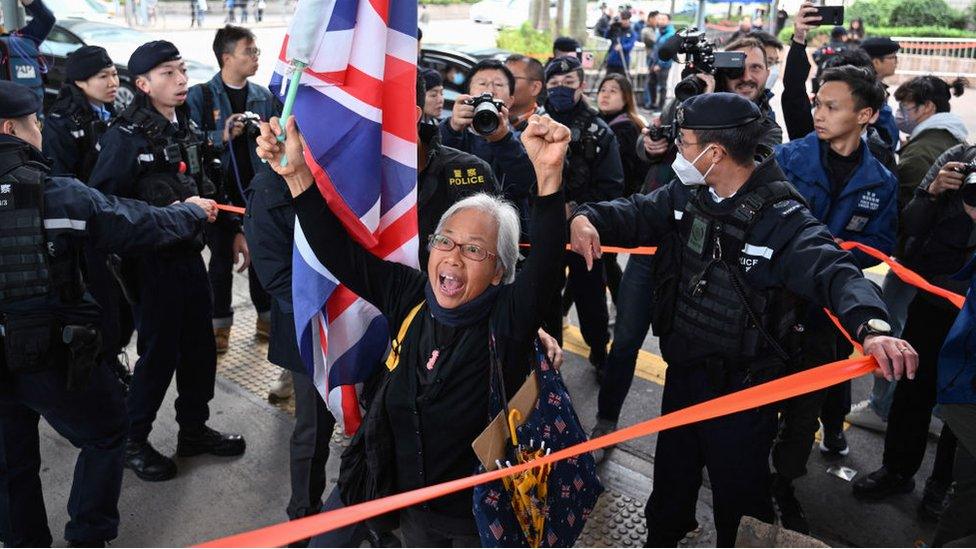Jimmy Lai: Hong Kong pro-democracy media tycoon's trial begins
- Published

All eyes are on Hong Kong as Jimmy Lai's long-awaited trial begins in the city on Monday
Pro-democracy media tycoon Jimmy Lai has gone on trial in Hong Kong on charges of breaching national security and colluding with foreign forces.
Mr Lai, 76, denies all the charges. Jailed since December 2020, he faces life in prison if he is found guilty.
The self-made millionaire was arrested under a security law which China is accused of using to crush dissent.
His case has caused an international outcry and is widely seen as a test of Hong Kong's judicial independence.
Mr Lai, who has been held in solitary confinement for the past three years, looked thinner than in earlier hearings as he appeared in court flanked by prison guards before three judges. He smiled and waved at relatives. He is one of more than 250 activists, lawmakers and protesters detained under the National Security Law (NSL) and sedition charges.
The landmark trial, delayed for a year, is expected to last for about 80 days.
Beijing, which introduced the NSL in 2020 in response to massive pro-democracy protests, insists the law is necessary to quell unrest. It considers Mr Lai a traitor who sought to undermine China's security. But critics say Mr Lai's case is yet another example of Beijing's tightening grip on the former British territory.

Grandma Wong outside the courtroom during Jimmy Lai's trial
Mr Lai's wife Teresa was present in court, along with family and Joseph Zen, the 92-year-old cardinal who was also arrested under the NSL but is now out on bail.
Outside the heavily guarded courthouse, 67-year-old Alexandra Wong - a prominent pro-democracy activist better known as Grandma Wong - had staged a lone protest, shouting slogans even as she was surrounded by police, before she was led away.
"I support Jimmy Lai because I want truth," Ms Wong said. "People won't trust us. I wish he can come out soon. I wish to read Apple Daily again."
Mr Lai's international legal team told the BBC he had been denied his right to a fair hearing. Beijing had barred him from appointing a UK lawyer, and he is being tried by three judges handpicked by Hong Kong's leader, a member of Mr Lai's London-based legal team said.
The US and the UK have called for Mr Lai, who holds British citizenship, to be released.
"I am gravely concerned that anyone is facing prosecution under the National Security Law, and particularly concerned at the politically motivated prosecution of British national Jimmy Lai," UK Foreign Secretary David Cameron said.
Apart from the NSL charges, Mr Lai is also facing a sedition charge under a colonial-era law based on his tweets, interviews he hosted, as well as articles published in the now-defunct Apple Daily newspaper he owned.
Stowaway to staunch Beijing critic
Mr Lai, an outspoken critic of the Chinese Communist Party, is one of the most high-profile people to be arrested under the NSL.
He was often on the frontline of Hong Kong's pro-democracy protests, from the Umbrella Movement in 2014 to the huge demonstrations against a Beijing-backed extradition bill in 2019. He founded and ran some of Hong Kong's best-known media outlets, including Apple Daily.
Mr Lai was born in Guangzhou in southern China in 1947 to a wealthy family, which lost everything when the communists took power. He fled China when he was just 12 and entered Hong Kong as a stowaway on a boat.
He started working in a garment sweatshop. He taught himself English and eventually founded the international clothing brand Giordano.
After tanks crushed pro-democracy protests in Beijing in 1989, Mr Lai's career veered towards political activism and media. In 2021, he was handed his first jail sentence in Hong Kong - 13 months - for participating in a banned vigil for the Tiananmen Square massacre.
Some of the most serious charges Mr Lai is facing now centre on Apple Daily, which he founded in 1995. The Chinese-language tabloid had been staunchly critical of Beijing and at one point called for international sanctions against Chinese and Hong Kong officials.
The newspaper shut in June 2021, after police froze $2.3m (£1.8m) of its assets, raided its offices and arrested some of its top editors. HongKongers mourned the closure of what was seen as the city's last independent newspaper.
Six former Apple Daily executives were arrested along with Mr Lai. They were accused of "colluding with foreign forces" to endanger national security, and have since pleaded guilty.
Human Rights Watch has condemned Mr Lai's trial as a "travesty". The group's China director Maya Wang called on "concerned governments" to press authorities to drop Mr Lai's charges, which she says have "contributed to seriously damaging press freedom in Hong Kong".
Beijing's and Hong Kong's actions have "undermined Hong Kong's democratic institutions and harmed Hong Kong's reputation as an international business and financial hub", US state department spokesperson Matthew Miller said, external.
China has denounced what it sees as international intervention in Mr Lai's case.
"The UK's backing of an anti-China, Hong Kong destabiliser who broke the law constitutes flagrant interference in a case that has already entered judicial proceedings," the Chinese embassy in the UK said.
Mr Lai's trial begins two weeks after the end of another long-running national security trial against pro-democracy figures known as the Hong Kong 47. A verdict is expected in March.
Several activists have also fled Hong Kong since Beijing began cracking down on protesters in 2020 - last week, Hong Kong police offered a fresh batch of bounties for information leading to the arrests of five pro-democracy activists who are living in exile.
Additional reporting by Frances Mao in Singapore, and Martin Yip and Danny Vincent in Hong Kong

Read more of our coverage on the Hong Kong protests


Sign up for our morning newsletter and get BBC News in your inbox.
